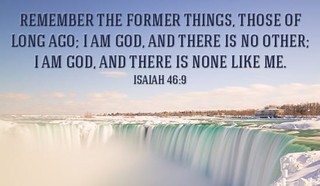
Change Translation
- Recent Translations
- All Translations
Images for Isaiah 46:7

Isaiah 46:7 in Other Translations
Isaiah 46:7 Meaning and Commentary
They bear him upon the shoulder, they carry him
That is, the idol; men carry him upon their shoulders in procession, and expose him to the view and veneration of the people, just as the host is carried in procession by the Papists; or the idol being made, the workman or his men lift it up, for it cannot lift up itself, and take it upon their shoulders, and carry it home to the proprietor: and set him in his place;
in his house, if an household god: or in the temple, church, or place of public worship, if designed for that: or cause him to rest under him
F16, or "in his place"; under the roof of his house or temple; a jeer upon him, as if he was weary of his long journey, though carried. Here again the idols are distinguished from the true God, and he from them; they are on men's shoulders, and set in a certain place, but he carries all his people, and is not limited to, or included in any place: and he standeth, and from his place he shall not remove;
the idol being set in his place stands fast, being nailed; he stands upright as a palm tree, and can never stir from the place where he is, to help any of his worshippers, in whatsoever distress they may be; nor can he get out of the way of any danger to which he may be exposed; if the temple or house, in which he is, is on fire, or overflowed with water, or broke into by thieves, he cannot move out of his place, and escape the danger; a fine deity to be worshipped indeed! see ( Isaiah 44:13 ) ( Jeremiah 10:4 Jeremiah 10:5 ) . Yea, one shall cry unto him, yet can he not answer;
as Baal's priests and worshippers cried to him, but no voice was heard, nor answer returned, ( 1 Kings 18:26 1 Kings 18:29 ) for though they have ears, they hear not, and mouths, yet they speak not, ( Psalms 115:5 Psalms 115:6 ) nor save him out of his trouble;
that is, the idol cannot save the idolatrous worshipper out of his distress, which has caused him to cry unto him; see ( Isaiah 45:20 ) .
F16 (wytxt whxyny) "et quiescere eum faciunt suo loco", Musculus.
Isaiah 46:7 In-Context
Study Tools
PLUSUnlock Notes
This feature is for PLUS subscribers only. Join PLUS today to access these tools and more.
JOIN PLUSUnlock Highlights
This feature is for PLUS subscribers only. Join PLUS today to access these tools and more.
JOIN PLUSUnlock Bookmarks
This feature is for PLUS subscribers only. Join PLUS today to access these tools and more.
JOIN PLUSTrack Your Reading
Create a free account to start a reading plan, or join PLUS to unlock our full suite of premium study tools.